French press coffee is a classic brewing method that has been around for over a century. It is a simple yet effective way of making a full-bodied cup of coffee that is rich in flavor and aroma. One of the key factors that determine the quality of French press coffee is the type of coffee beans used. In this article, we will explore the best coffee for French press and how to select, grind, and brew the perfect cup.
Understanding French Press Coffee
To understand the best coffee for French press, it is essential to first understand the brewing process. French press coffee is made by steeping coarsely ground coffee beans in hot water for several minutes. The coffee is then separated from the grounds by pressing down a plunger fitted with a metal or nylon mesh filter. This method allows the oils and flavors of the coffee to be extracted, resulting in a full-bodied and flavorful cup.
Selecting the Best Coffee Beans
The quality of the coffee beans used is crucial in determining the taste and aroma of the coffee. The best coffee for French press is one that is freshly roasted, has a medium to dark roast profile, and is made from high-quality Arabica beans. Arabica beans are known for their complex flavor profile and low acidity, making them ideal for French press coffee. Additionally, the beans should be freshly ground just before brewing to ensure maximum flavor extraction.
Key Takeaways
- French press coffee is a simple yet effective way of making a full-bodied cup of coffee.
- The quality of the coffee beans used is crucial in determining the taste and aroma of the coffee.
- The best coffee for French press is freshly roasted, has a medium to dark roast profile, and is made from high-quality Arabica beans.
Understanding French Press Coffee
History of the French Press
The French Press, also known as a press pot or plunger pot, is a popular brewing method that has been around for over 100 years. The first French Press was patented in 1929 by an Italian designer named Attilio Calimani. However, the French Press is believed to have originated in France in the late 1800s.
Benefits of French Press Brewing
One of the main benefits of using a French Press to brew coffee is the control it gives the user over the brewing process. The user can adjust the water temperature, the amount of coffee used, and the brewing time to achieve the desired strength and flavor profile. Additionally, French Press coffee is typically richer and more full-bodied than coffee brewed with other methods, as the coffee oils and flavors are not filtered out by a paper filter.
French Press vs Other Brewing Methods
Compared to other popular brewing methods such as espresso, cold brew, drip coffee makers, and pour over, the French Press offers a unique brewing experience. While espresso is known for its strong, concentrated flavor, it requires expensive equipment and a certain level of skill to brew properly. Cold brew, on the other hand, is a much more time-consuming process and requires a long steeping time. Drip coffee makers and pour over methods are more convenient and quicker, but they do not offer the same depth of flavor and control over the brewing process as the French Press.
In summary, the French Press is a classic brewing method that offers a rich and full-bodied coffee experience. Its simplicity and flexibility make it a popular choice for coffee lovers who want control over their brewing process.
Selecting the Best Coffee Beans
When it comes to making the perfect cup of coffee using a French press, selecting the right coffee beans is crucial. Here are some important factors to consider when choosing the best coffee beans for your French press.
Types of Coffee Beans
There are two main types of coffee beans: Arabica and Robusta. Arabica beans are generally considered to be of higher quality and have a smoother, less bitter taste. Robusta beans, on the other hand, are more bitter and have a higher caffeine content. When it comes to French press coffee, most people prefer to use Arabica beans for their smooth, rich flavor.
Roast Profiles for French Press
The roast profile of your coffee beans will also have a significant impact on the flavor of your French press coffee. Dark roast coffee beans are a popular choice for French press coffee because they have a bold, rich flavor that can stand up to the brewing process. However, if you prefer a lighter roast, that can work well too. Just be aware that lighter roasts may produce a more delicate flavor that is better suited to other brewing methods.
Origin and Flavor Notes
The origin of your coffee beans can also have an impact on the flavor of your French press coffee. For example, Sumatra beans are known for their earthy, spicy flavor, while Kenyan beans are known for their bright, fruity notes. Many coffee roasters also offer their own house blend, which can be a great option if you’re looking for a balanced, well-rounded flavor.
When selecting coffee beans for your French press, it’s also important to consider the aroma of the beans. The aroma can give you an idea of the flavor notes that you can expect in your coffee. Look for beans with a strong, pleasant aroma that matches the flavor profile you’re looking for.
By considering the type of beans, roast profile, origin, and flavor notes, you can select the best coffee beans for your French press and enjoy a delicious, flavorful cup of coffee every time.
Grinding for French Press
The Importance of Grind Size
Grinding coffee beans is an essential step in the process of making coffee, and it is especially important when it comes to French press. The size of the grind affects the extraction of the coffee, which in turn affects the taste of the final product. For French press, a coarse grind is necessary to ensure that the coffee doesn’t become over-extracted and bitter.
When coffee is coarsely ground, it leaves behind larger particles of coffee that are easier for water to pass through. This means that the water can extract the flavor from the coffee without picking up too much grit or sediment. On the other hand, if the coffee is ground too finely, it can become over-extracted and lead to a bitter taste.
Best Grinders for French Press
When it comes to grinding coffee for French press, there are a few different types of grinders that can do the job. However, burr grinders are the best option for achieving a consistent and even grind size.
Burr grinders use two revolving abrasive surfaces to grind the coffee beans, which ensures that each particle of coffee is ground to the same size. This is important for French press because it allows for an even extraction of the coffee, resulting in a smooth and flavorful cup.
Some popular burr grinders for French press include the Baratza Encore, the OXO BREW Conical Burr Coffee Grinder, and the Breville Smart Grinder Pro. These grinders offer a range of grind settings and are easy to use, making them a great choice for any coffee lover looking to make the perfect cup of French press coffee.
In conclusion, when it comes to French press coffee, the grind size is crucial for achieving a smooth and flavorful cup. Using a burr grinder and a coarse grind will ensure that the coffee is properly extracted and free of grit.
The Brewing Process
When it comes to French press coffee, the brewing process is crucial to achieving a rich and bold flavor. Here are some important factors to consider:
Coffee-to-Water Ratio
The ideal coffee-to-water ratio for French press coffee is 1:15 or 1:16. This means for every 1 gram of coffee grounds, you should use 15-16 grams of water. Using too much coffee or too little water can result in an overly strong and bitter brew.
Water Temperature and Quality
The water used for French press coffee should be between 195-205°F (90-96°C). It’s also important to use high-quality, filtered water to avoid any unwanted flavors.
Timing and Extraction
The extraction time for French press coffee should be around 4-5 minutes. It’s important to let the coffee grounds steep in the water for this amount of time to ensure optimal flavor extraction.
Plunging Techniques
When it’s time to plunge, be sure to do so slowly and steadily. This helps to avoid any grounds from escaping into the coffee and also allows for a more even extraction. Additionally, some coffee enthusiasts recommend stirring the coffee before plunging to ensure an even extraction.
Overall, the French press brewing process is all about finding the right balance between water, coffee grounds, and extraction time. With a little practice and experimentation, anyone can achieve a delicious and bold cup of coffee.
French Press Equipment
When it comes to making the perfect cup of coffee with a French press, having the right equipment is essential. Here are some considerations to keep in mind when choosing a French press coffee maker:
Choosing a French Press Coffee Maker
There are many different types of French press coffee makers on the market, ranging from basic models to more advanced options with additional features. Some popular models include the Frieling French Press, Chambord, and Bodum Chambord.
When selecting a French press, it’s important to consider the size and capacity of the coffee maker. It’s also important to choose a model with a handle that is comfortable to grip and easy to use.
Material and Design Considerations
The material and design of the French press can also impact the taste and quality of the coffee. Glass beakers are a popular option, as they allow you to see the coffee as it brews. Stainless steel models are also available and offer superior heat retention.
When selecting a French press, it’s important to look for models with a high-quality mesh filter, as this will help to prevent coffee grounds from getting into your cup. Thermal models, such as the Espro P3 and Caffettiera P6, are also available and can help to keep your coffee hot for longer.
Additional Accessories
In addition to the French press itself, there are a variety of accessories that can help to enhance your coffee-making experience. Replacement parts, such as filters and glass beakers, are available for many models. Double filter systems, such as the Fellow Clara French Press and Espro P7 French Press, can also help to improve the quality of your coffee.
Overall, selecting the right French press equipment is key to making a delicious cup of coffee. By considering factors such as size, material, and additional accessories, you can find a model that suits your needs and preferences.
Tasting and Troubleshooting
Assessing Flavor and Mouthfeel
When tasting coffee brewed in a French press, there are a few things to keep in mind. First, assess the flavor. Does it taste sour or bitter? Is the coffee too thin or full-bodied? Take note of any bold flavors that stand out. Next, consider the mouthfeel. Does the coffee feel smooth or gritty? Is there a noticeable crema? These factors can help determine the quality of the coffee and whether any adjustments need to be made.
Common Brewing Mistakes
There are a few common mistakes that can lead to subpar French press coffee. One is using water that is too hot, which can result in a bitter taste. Another is using too little coffee, which can make the coffee taste weak. Additionally, leaving the coffee in the French press for too long can lead to sediment and a gritty mouthfeel. Finally, using stale or low-quality beans can also affect the flavor of the coffee.
Adjusting Variables for Better Coffee
To improve the quality of French press coffee, there are a few variables that can be adjusted. First, consider the grind size. A coarser grind will result in a smoother mouthfeel and less sediment, while a finer grind will result in a bolder flavor. Next, adjust the coffee-to-water ratio. A good starting point is 1:15, but this can be adjusted based on personal preference. Finally, consider the water temperature. Water that is between 195-205°F is ideal for French press coffee. By adjusting these variables, it is possible to achieve a better cup of coffee in a French press.
Maintenance and Care
Cleaning Your French Press
Maintaining a clean French press is essential to ensure the quality and taste of your coffee. After each use, it is recommended to disassemble the press and rinse the parts with hot water. Use a non-abrasive sponge or brush to remove any coffee residue or stains. Avoid using harsh detergents or abrasive cleaners as they can damage the glass or metal parts.
For a deeper clean, you can use a mixture of water and vinegar to remove any build-up. Simply fill the press with equal parts of water and vinegar, let it sit for a few minutes, and then rinse thoroughly with hot water.
If you prefer to use a dishwasher, make sure to check if your French press is dishwasher-safe. Some models are not suitable for dishwashers, and exposure to high temperatures and harsh detergents can cause damage. If your French press is dishwasher-safe, make sure to disassemble it before placing it in the dishwasher.
Longevity and Replacement Parts
With proper care and maintenance, a high-quality French press can last for many years. However, some parts may wear out over time and need to be replaced. The most common parts that need replacement are the mesh filter and the glass carafe.
When purchasing replacement parts, make sure to buy them from a reputable source and ensure that they are compatible with your French press model. It is also recommended to buy a few extra mesh filters as they tend to wear out faster than other parts.
In conclusion, proper maintenance and care are essential to ensure the longevity and optimal performance of your French press. Regular cleaning and occasional deep cleaning will help maintain the quality and taste of your coffee. Additionally, purchasing replacement parts from a reputable source will ensure that your French press continues to function properly for many years to come.
Expert Reviews and Recommendations
When it comes to brewing coffee using a French press, the quality of the coffee beans used plays a crucial role in determining the taste and aroma of the final product. Here are some expert reviews and recommendations for the best coffee for French press:
Top Picks for French Press Coffee
- Blue Bottle Coffee: This specialty coffee roaster is known for its high-quality, single-origin coffee beans that are roasted to perfection. Their French roast coffee beans are a popular choice for French press brewing, as they have a bold and rich flavor that stands up well to the brewing method.
- Stumptown Coffee Roasters: Another specialty coffee roaster that offers a wide variety of coffee beans for French press brewing. Their Hair Bender blend is a popular choice, as it has a balanced flavor profile with notes of chocolate and citrus.
- Intelligentsia Coffee: This Chicago-based coffee roaster is known for its direct trade practices and commitment to sustainability. Their Black Cat Classic Espresso blend is a great choice for French press brewing, as it has a smooth and full-bodied flavor with notes of caramel and dark chocolate.
Budget-Friendly Options
- Lavazza Qualita Rossa: This Italian coffee brand offers a budget-friendly option for French press brewing. Their Qualita Rossa blend is a medium roast coffee with a well-balanced flavor profile that is perfect for those on a budget.
- Eight O’Clock Coffee: This American coffee brand offers a variety of affordable coffee beans that are perfect for French press brewing. Their Original blend is a popular choice, as it has a smooth and mellow flavor that is perfect for any time of day.
When selecting the best coffee for French press, it is important to consider factors such as price, coffee quality, freshness, and roasting process. By choosing one of these expert-recommended coffee brands, you can be confident that you are getting a high-quality product that will deliver a delicious cup of coffee every time.
Frequently Asked Questions
What characteristics define the ideal coffee beans for a French press?
The ideal coffee beans for French press brewing are those with a bold and rich flavor profile. A medium to dark roast is recommended, as it brings out the natural oils in the coffee beans, which contributes to a fuller flavor and aroma. Beans that are grown at high altitudes and in nutrient-rich soil tend to have a more complex flavor profile, making them a great choice for French press brewing.
How does the roast level of coffee beans affect the taste when brewed in a French press?
The roast level of coffee beans has a significant impact on the taste when brewed in a French press. Lightly roasted beans tend to have a more acidic and fruity taste, while dark roasted beans have a more robust and bitter taste. Medium roasted beans are a good choice for French press brewing, as they strike a balance between acidity and bitterness, resulting in a smooth and rich flavor.
What is the recommended grind size for coffee used in a French press?
The recommended grind size for coffee used in a French press is a coarse grind. This ensures that the coffee grounds are large enough to be filtered out by the press, while still allowing for a full extraction of flavor and aroma from the beans. A fine grind can result in over-extraction, leading to a bitter taste.
Can pre-ground coffee be used effectively in a French press, and if so, which types?
Pre-ground coffee can be used effectively in a French press, but it is important to choose the right type of coffee. Look for coffee that is labeled specifically for French press brewing, as it will be coarsely ground and have the right flavor profile for this brewing method. Avoid using finely ground coffee, as it can result in over-extraction and a bitter taste.
What are the top-rated coffee brands for French press brewing available in supermarkets?
Some of the top-rated coffee brands for French press brewing available in supermarkets include Starbucks, Peet’s Coffee, and Lavazza. It is important to choose a brand that offers coffee beans that are specifically labeled for French press brewing, as this ensures the right grind size and flavor profile.
How should coffee be stored to maintain its freshness for French press brewing?
Coffee should be stored in an airtight container away from light, heat, and moisture to maintain its freshness for French press brewing. It is best to buy whole bean coffee and grind it just before brewing, as this ensures maximum freshness and flavor. Avoid storing coffee in the refrigerator or freezer, as this can cause moisture to accumulate and affect the taste.

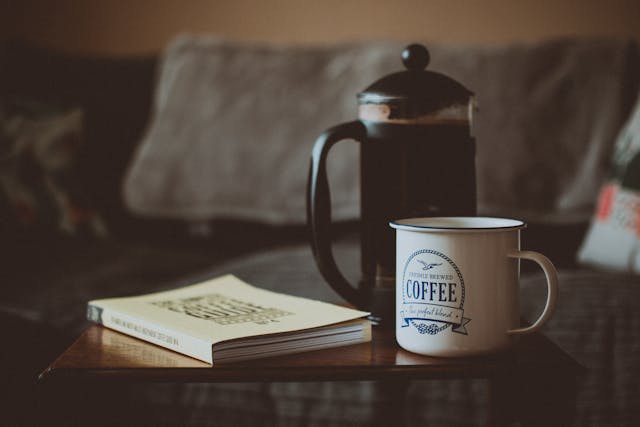
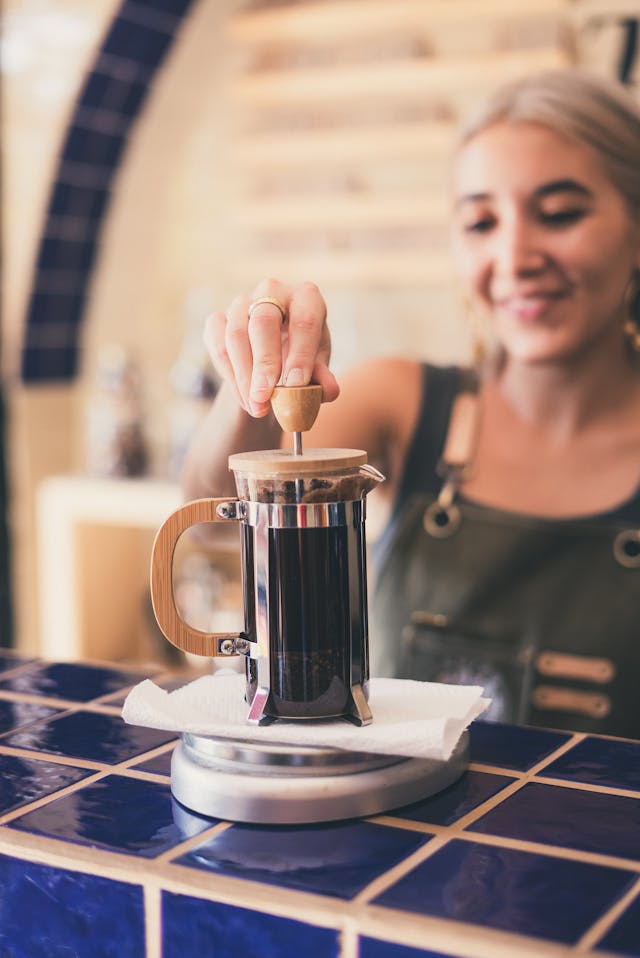
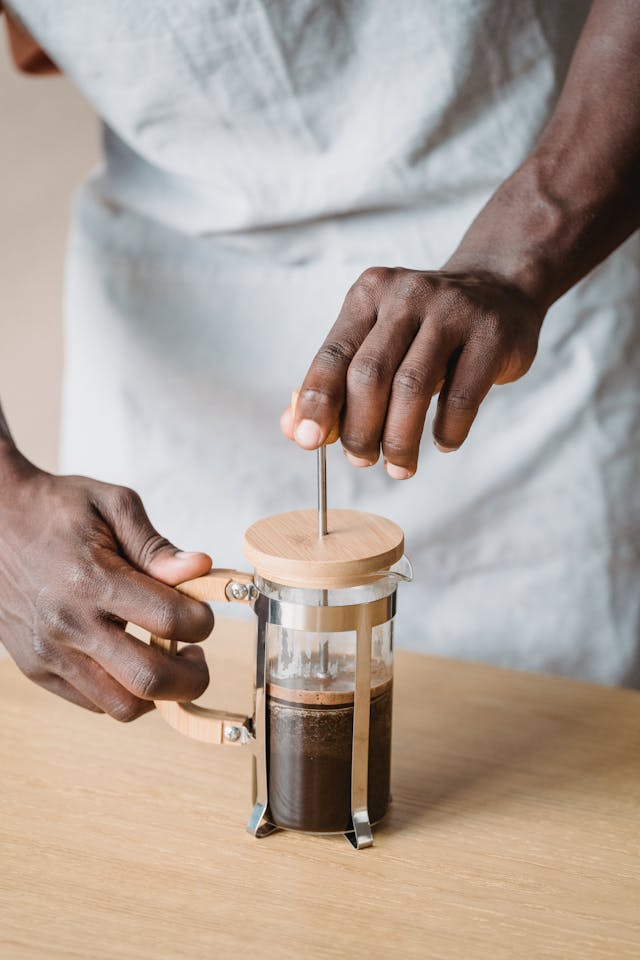
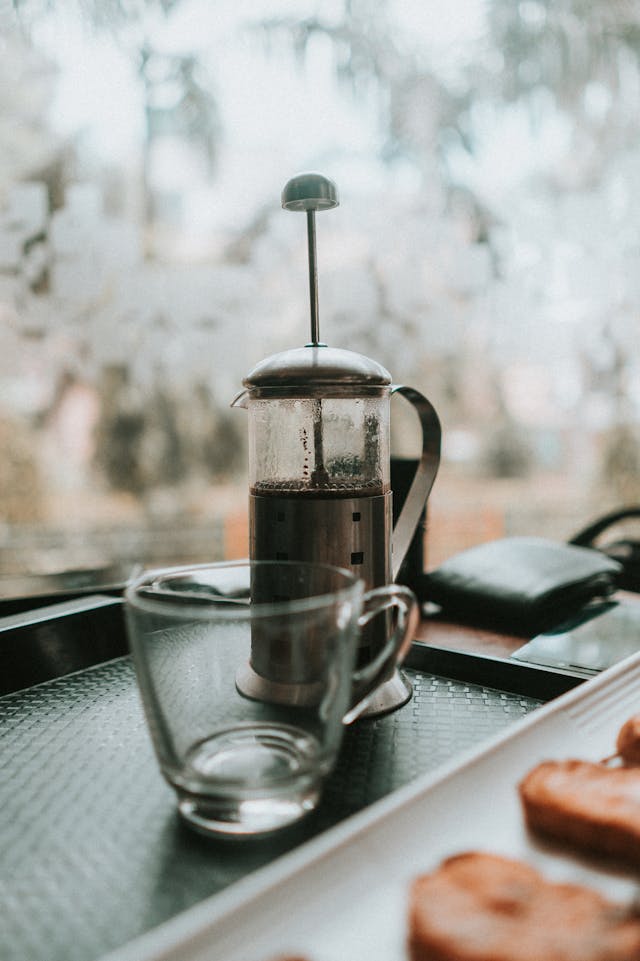
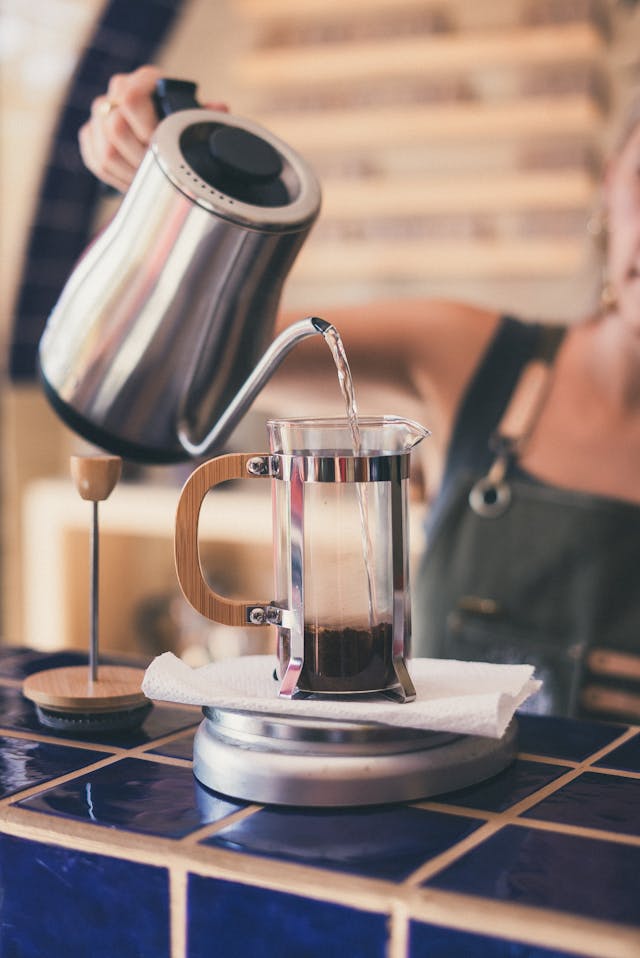
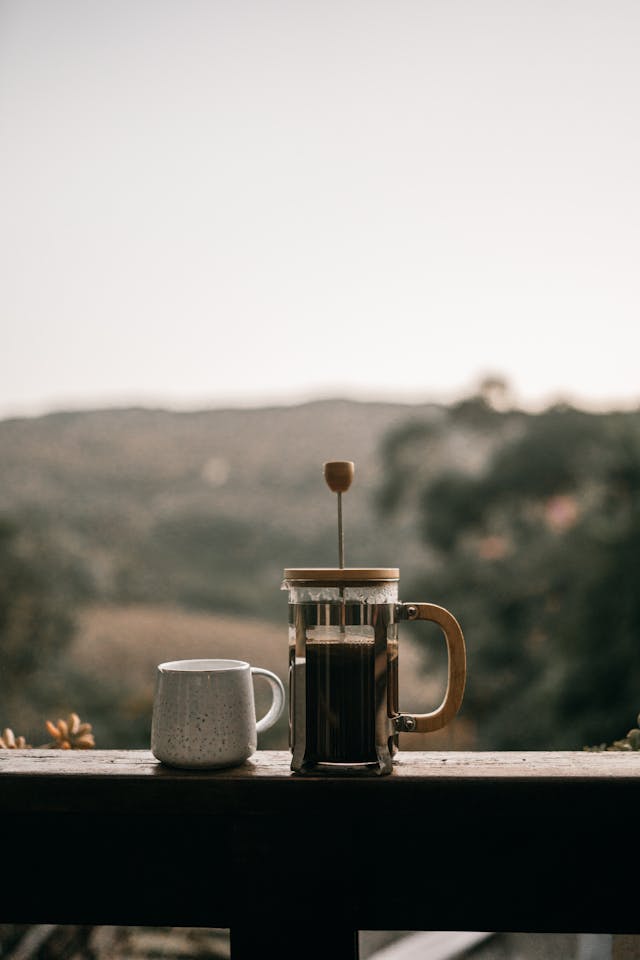








Comments are closed.